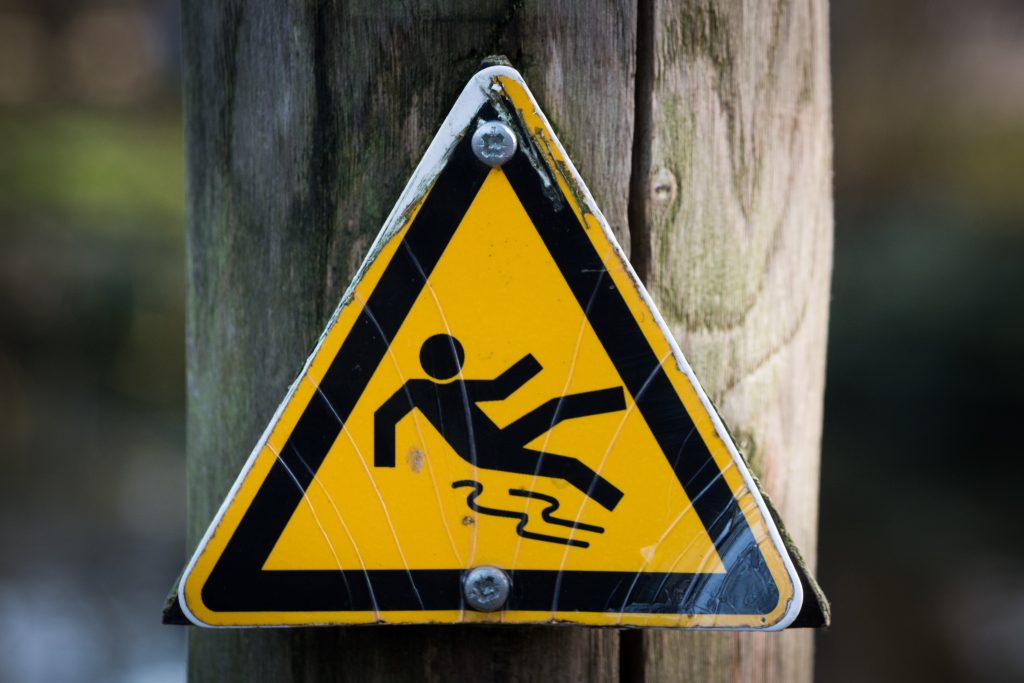 When you ask a friend for a favor, whether it is for a ride to the airport or for help cleaning up a room, you never expect that you will end up facing off against each other in a lawsuit. However, when you do end up in such an unfortunate situation, it is important to have a good lawyer on hand to ensure that the dispute is resolved in the quickest manner possible. Michael P. Cox found himself in just such a situation when his friend Laina Dutton offered to help him clean out the building of his recently closed business, Xtreme Nutrition, located in Baton Rouge, Louisiana. When Mr. Cox was out of the room, Ms. Dutton decided to climb a ladder and remove a banner that was hanging on the wall. The ladder was not in a secure location and Ms. Dutton fell backward off the ladder injuring her back and side. She sued Mr. Cox, Xtreme Nutrition, and Allstate Insurance, the insurer for Mr. Cox and Xtreme Nutrition. Ms. Dutton’s lawsuit for negligence was premised on the argument that Mr. Cox owed her a duty to erect the ladder safely, monitor and assist her in the use of the ladder, and warn her of any danger in using it. She argued that the ladder had been set up in a dangerous manner because it was not placed on a flat surface, that Mr. Cox did not warn her of this issue, and that he was at fault for her fall due to his inattentiveness. Ms. Dutton suffered injuries to her arm, back, and spine. For these injuries, she sought special and general damages.
When you ask a friend for a favor, whether it is for a ride to the airport or for help cleaning up a room, you never expect that you will end up facing off against each other in a lawsuit. However, when you do end up in such an unfortunate situation, it is important to have a good lawyer on hand to ensure that the dispute is resolved in the quickest manner possible. Michael P. Cox found himself in just such a situation when his friend Laina Dutton offered to help him clean out the building of his recently closed business, Xtreme Nutrition, located in Baton Rouge, Louisiana. When Mr. Cox was out of the room, Ms. Dutton decided to climb a ladder and remove a banner that was hanging on the wall. The ladder was not in a secure location and Ms. Dutton fell backward off the ladder injuring her back and side. She sued Mr. Cox, Xtreme Nutrition, and Allstate Insurance, the insurer for Mr. Cox and Xtreme Nutrition. Ms. Dutton’s lawsuit for negligence was premised on the argument that Mr. Cox owed her a duty to erect the ladder safely, monitor and assist her in the use of the ladder, and warn her of any danger in using it. She argued that the ladder had been set up in a dangerous manner because it was not placed on a flat surface, that Mr. Cox did not warn her of this issue, and that he was at fault for her fall due to his inattentiveness. Ms. Dutton suffered injuries to her arm, back, and spine. For these injuries, she sought special and general damages.
However, the lawsuit never made it to trial. The Trial Court granted summary judgment in favor of the defendants and dismissed the case with prejudice. The Trial Court dismissed the case following pre-trial discovery based on its finding that there was a lack of evidence supporting a negligence claim and that Mr. Cox did not owe a duty to Ms. Dutton. Ms. Dutton appealed, arguing that the Trial Court erred in dismissing the case, but the Louisiana First Circuit Court of Appeal affirmed the dismissal. So, why was Mr. Cox not found negligent in Ms. Dutton’s fall?
The Trial Court based its dismissal on its view that Ms. Dutton could not produce enough evidence to support the negligence claim. This was because Ms. Dutton was not an employee of Xtreme Nutrition, and Mr. Cox did not pay her to help him clear out the newly closed offices. Further, Ms. Dutton climbed up on the ladder while Mr. Cox was in another room. He had not asked her to climb the ladder and probably did not even know she had gone up. Ms. Dutton even admitted that she had used the ladder before the fall without any problems and did not think the ladder was defective in any way. Because Ms. Dutton had not been instructed by Mr. Cox to go up the ladder, and there was no evidence that he had set up the ladder in a negligent manner, the Trial Court determined that there was no evidence to support a negligence lawsuit following discovery. Thus, the Court dismissed the case before heading to trial. From this decision Ms. Dutton appealed, arguing that the Trial Court erred in two major ways. First, she argued that the only reasonable explanation for the ladder fall was that it had been improperly set up by Mr. Cox. Additionally, since Mr. Cox had set up the ladder, he owed her a duty to properly set it up and he had failed in that duty when he allowed her to climb the ladder in such an unsafe condition. Second, Ms. Dutton argued that in his deposition testimony, Mr. Cox had admitted that he set up the ladder in a dangerous manner by placing one leg on a part of an adjacent desk and the other on the ground, leading to an imbalance that caused the fall. Ms. Dutton argued that these two points were genuine issues of material fact that should preclude a summary judgment dismissal.
 Listening is the most important skill for an attorney. This is of paramount importance when following court orders. A lawyer must be careful in how his actions appear and the actions he takes when attempting to enter in a case, but what happens when a lawyer violates court orders?
Listening is the most important skill for an attorney. This is of paramount importance when following court orders. A lawyer must be careful in how his actions appear and the actions he takes when attempting to enter in a case, but what happens when a lawyer violates court orders? Louisiana Personal Injury Lawyer Blog
Louisiana Personal Injury Lawyer Blog


 Walmart is buzzing with pedestrian traffic on a daily basis. Where crowds of people are gathered, accidents are sure to follow. Sometimes Walmart’s products are knocked off of shelves, children spill juice in the aisles, and liquid products can slip from a person’s grasp and splatter across the floor leaving a hazardous environment for anyone to slip and fall. Despite Walmart’s best efforts to keep the stores clean, accidents still happen. As a result, legal services may be needed. If that is the case, information about the parties involved is exchanged between the opposing counsels for a period of time known as discovery. Information may be gathered through depositions or a series of questions under sworn testimony out of court. Once sufficient time has been provided for discovery, a party may determine that there is no factual basis for the case to move forward. Because of this lack of material fact, the party may then make a motion for summary judgment. This motion, if granted, can result in a dismissal of the entire lawsuit. Our justice system, however, provides an appeal process for situations where these judgments were granted in error! So, what do you do when you have been blindsided by summary judgement?
Walmart is buzzing with pedestrian traffic on a daily basis. Where crowds of people are gathered, accidents are sure to follow. Sometimes Walmart’s products are knocked off of shelves, children spill juice in the aisles, and liquid products can slip from a person’s grasp and splatter across the floor leaving a hazardous environment for anyone to slip and fall. Despite Walmart’s best efforts to keep the stores clean, accidents still happen. As a result, legal services may be needed. If that is the case, information about the parties involved is exchanged between the opposing counsels for a period of time known as discovery. Information may be gathered through depositions or a series of questions under sworn testimony out of court. Once sufficient time has been provided for discovery, a party may determine that there is no factual basis for the case to move forward. Because of this lack of material fact, the party may then make a motion for summary judgment. This motion, if granted, can result in a dismissal of the entire lawsuit. Our justice system, however, provides an appeal process for situations where these judgments were granted in error! So, what do you do when you have been blindsided by summary judgement? When one is injured by an employee’s negligence, it is reasonable to expect an award of damages from the employer. When an injured party files a lawsuit, however, the plaintiff must prove that the one who caused his injuries was indeed an employee of the business. For most cases, this is very easy to prove. When there is a question of identity, though, the evidence available can make or break the lawsuit.
When one is injured by an employee’s negligence, it is reasonable to expect an award of damages from the employer. When an injured party files a lawsuit, however, the plaintiff must prove that the one who caused his injuries was indeed an employee of the business. For most cases, this is very easy to prove. When there is a question of identity, though, the evidence available can make or break the lawsuit. Medical malpractice lawsuits are filed for a wide range of injuries and even death. When a patient finds himself in a scenario where he believes a medical professional could have done more to prevent his injuries or cure his condition, he may decide to go through with a lawsuit. Medical malpractice lawsuits often require expert witnesses to succeed and proving damages in these cases where the patient enters a medical facility sick or injured can be a tough case to win. So, can you lose your medical malpractice case if you do not have enough evidence?
Medical malpractice lawsuits are filed for a wide range of injuries and even death. When a patient finds himself in a scenario where he believes a medical professional could have done more to prevent his injuries or cure his condition, he may decide to go through with a lawsuit. Medical malpractice lawsuits often require expert witnesses to succeed and proving damages in these cases where the patient enters a medical facility sick or injured can be a tough case to win. So, can you lose your medical malpractice case if you do not have enough evidence? Imagine coming home one day to discover your beloved pet is missing. Typically in this scenario, we would expect the judicial system to act in our favor if we know who the culprit is. This can be difficult across state lines, and even when the court is on your side, collecting on the ruling may not be so easy. It’s even more difficult if the court fails in legally required procedures of the case. In this case we are left with the question: what do you do when someone refuses to return your dog to you?
Imagine coming home one day to discover your beloved pet is missing. Typically in this scenario, we would expect the judicial system to act in our favor if we know who the culprit is. This can be difficult across state lines, and even when the court is on your side, collecting on the ruling may not be so easy. It’s even more difficult if the court fails in legally required procedures of the case. In this case we are left with the question: what do you do when someone refuses to return your dog to you?  Summary judgment is a legal procedure courts may use to dispose of a case when there are not enough facts in dispute to proceed with a lawsuit. This is a good strategy to use when applicable because it purges certain claims that have no merit, saving time and money. The Fifth Circuit Court of Appeal demonstrated the principles of summary judgment within the context of an employment discrimination lawsuit when it comes to untimely filing.
Summary judgment is a legal procedure courts may use to dispose of a case when there are not enough facts in dispute to proceed with a lawsuit. This is a good strategy to use when applicable because it purges certain claims that have no merit, saving time and money. The Fifth Circuit Court of Appeal demonstrated the principles of summary judgment within the context of an employment discrimination lawsuit when it comes to untimely filing.  Having surgery is always a stressful situation. Nobody wants to leave the hospital only to return a short time later from complications due to the first surgery. This is unfortunately what happened to Mr. James Nelson, who sued his surgeon, Dr. F, in East Baton Rouge Parish. So, what happens when you develop a new medical condition after your surgery?
Having surgery is always a stressful situation. Nobody wants to leave the hospital only to return a short time later from complications due to the first surgery. This is unfortunately what happened to Mr. James Nelson, who sued his surgeon, Dr. F, in East Baton Rouge Parish. So, what happens when you develop a new medical condition after your surgery? When you ask a friend for a favor, whether it is for a ride to the airport or for help cleaning up a room, you never expect that you will end up facing off against each other in a lawsuit. However, when you do end up in such an unfortunate situation, it is important to have a good lawyer on hand to ensure that the dispute is resolved in the quickest manner possible. Michael P. Cox found himself in just such a situation when his friend Laina Dutton offered to help him clean out the building of his recently closed business, Xtreme Nutrition, located in Baton Rouge, Louisiana. When Mr. Cox was out of the room, Ms. Dutton decided to climb a ladder and remove a banner that was hanging on the wall. The ladder was not in a secure location and Ms. Dutton fell backward off the ladder injuring her back and side. She sued Mr. Cox, Xtreme Nutrition, and Allstate Insurance, the insurer for Mr. Cox and Xtreme Nutrition. Ms. Dutton’s lawsuit for negligence was premised on the argument that Mr. Cox owed her a duty to erect the ladder safely, monitor and assist her in the use of the ladder, and warn her of any danger in using it. She argued that the ladder had been set up in a dangerous manner because it was not placed on a flat surface, that Mr. Cox did not warn her of this issue, and that he was at fault for her fall due to his inattentiveness. Ms. Dutton suffered injuries to her arm, back, and spine. For these injuries, she sought special and general damages.
When you ask a friend for a favor, whether it is for a ride to the airport or for help cleaning up a room, you never expect that you will end up facing off against each other in a lawsuit. However, when you do end up in such an unfortunate situation, it is important to have a good lawyer on hand to ensure that the dispute is resolved in the quickest manner possible. Michael P. Cox found himself in just such a situation when his friend Laina Dutton offered to help him clean out the building of his recently closed business, Xtreme Nutrition, located in Baton Rouge, Louisiana. When Mr. Cox was out of the room, Ms. Dutton decided to climb a ladder and remove a banner that was hanging on the wall. The ladder was not in a secure location and Ms. Dutton fell backward off the ladder injuring her back and side. She sued Mr. Cox, Xtreme Nutrition, and Allstate Insurance, the insurer for Mr. Cox and Xtreme Nutrition. Ms. Dutton’s lawsuit for negligence was premised on the argument that Mr. Cox owed her a duty to erect the ladder safely, monitor and assist her in the use of the ladder, and warn her of any danger in using it. She argued that the ladder had been set up in a dangerous manner because it was not placed on a flat surface, that Mr. Cox did not warn her of this issue, and that he was at fault for her fall due to his inattentiveness. Ms. Dutton suffered injuries to her arm, back, and spine. For these injuries, she sought special and general damages.  For any legal claim, there is a set period of time for which the claim must be brought. This set period of time is known as a statute of limitations, which can vary based on the type of claim. If a claim is not filed prior to the expiration of the statute of limitations, the right to bring the claim is extinguished. Furthermore, if an attorney was retained to bring the claim and failed to do so in a timely manner, the attorney may be sued for malpractice. So, in Louisiana can you sue your lawyer for not filing your claim on time?
For any legal claim, there is a set period of time for which the claim must be brought. This set period of time is known as a statute of limitations, which can vary based on the type of claim. If a claim is not filed prior to the expiration of the statute of limitations, the right to bring the claim is extinguished. Furthermore, if an attorney was retained to bring the claim and failed to do so in a timely manner, the attorney may be sued for malpractice. So, in Louisiana can you sue your lawyer for not filing your claim on time? A non-compete agreement often takes the form of a clause in an employment contract whereby an employer seeks to restrict a former employee’s ability to compete with the employer after the employment relationship is terminated. These types of clauses are usually valid if they are reasonable in scope, time, and area and line of business. But, what happens happens when someone ignores a non-compete agreement in Louisiana?
A non-compete agreement often takes the form of a clause in an employment contract whereby an employer seeks to restrict a former employee’s ability to compete with the employer after the employment relationship is terminated. These types of clauses are usually valid if they are reasonable in scope, time, and area and line of business. But, what happens happens when someone ignores a non-compete agreement in Louisiana?